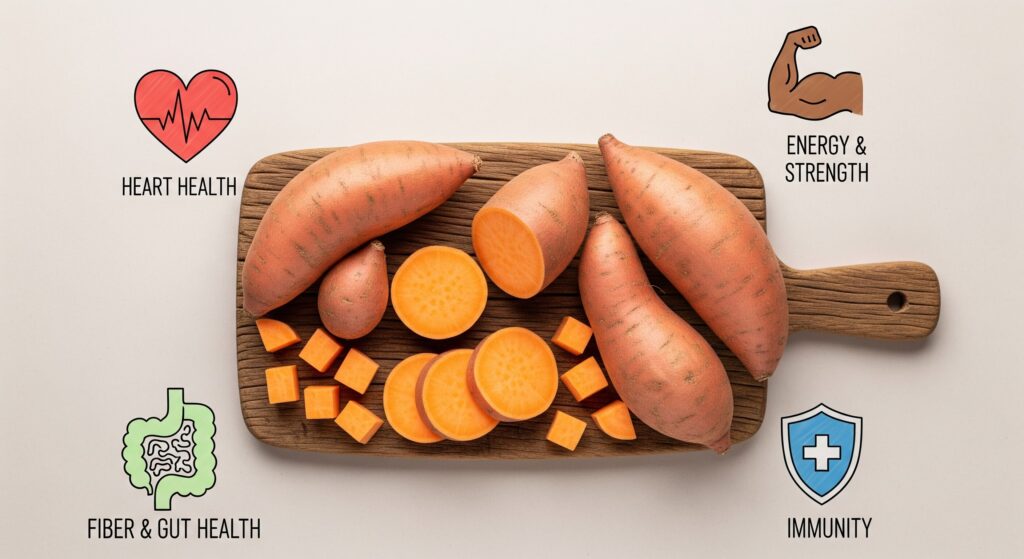In Indian kitchens, the sweet potato, known locally as shakarkandi, has often been overlooked as a simple street snack or seasonal treat. But this colourful root vegetable packs a powerful health punch. Naturally sweet, power-packed, and 100% plant-based, sweet potatoes have become the new star among health-conscious athletes and families on-the-go.
Beyond their comforting taste, sweet potatoes provide a rich combination of dietary fibre, essential vitamins, minerals, and antioxidants that actively support overall wellness. Coming in all sorts of hues from orange to purple, the roots can be baked, roasted, boiled, or mashed and are a versatile ingredient that not only appeals to the taste buds, but also to the body.
Understanding the Sweet Potato
Sweet potatoes are related to morning glories and are scientifically known as Ipomoea batatas. Not to be confused with regular potatoes, they are anatomically different and offer quite different nutritional benefits. Their sweet, often fibrous flesh can range from smooth to crunchy, depending on the cultivar. Deep orange, golden yellow, purple, and white types each offer distinctive antioxidants while retaining core nutrients.
Originally cultivated in Central and South America, sweet potatoes have now become a staple across global cuisines. Their adaptability allows them to shine in savoury and sweet dishes alike, making them a favourite for families who value both taste and nutrition.
Sweet Potato and Regular Potato Comparison
Choosing between sweet potatoes and regular potatoes often sparks questions about nutrition. Sweet potatoes are generally superior in vitamins and antioxidants while maintaining a moderate calorie profile. A simple comparison per 100 grams shows the distinction:
| Nutrient | Sweet Potato | Regular Potato |
| Calories | ~86 | ~77 |
| Carbohydrates | 20g | 17g |
| Dietary Fibre | 3g | 2g |
| Vitamin A | Very High | Minimal |
| Vitamin C | Good source | Good source |
| Potassium | High | High |
The higher fibre content, rich vitamin A levels, and unique antioxidant compounds make sweet potatoes a preferred option for those who want nourishing, long-lasting energy.
Nutritional Highlights
Sweet potatoes are naturally low in fat but rich in nutrients, making them an excellent addition to any diet. They offer:
- Dietary Fibre: Supports digestion, regulates blood sugar, and alleviates constipation.
- Beta-carotene (Vitamin A precursor): Promotes healthy vision, immune function, and cellular repair. One medium sweet potato supplies more than the daily requirement for Vitamin A.
- Vitamins C and B6: Aid metabolism, enhance brain function, and strengthen immunity.
- Potassium and Magnesium: Contribute to heart health, muscle recovery, and stress regulation.
- Antioxidants: Purple varieties contain anthocyanins that combat inflammation and oxidative stress.
- Gluten-Free and Low-Fat: Suitable for gluten-sensitive diets and those seeking healthier carbohydrate sources.
Health Benefits of Sweet Potatoes

Incorporating sweet potatoes into daily meals offers more than taste; it actively benefits health in multiple ways:
- Digestive Wellness: Fibre keeps the gut functioning smoothly and prevents constipation.
- Immune Support: Vitamins A and C enhance natural defence mechanisms.
- Vision Protection: Beta-carotene helps maintain eye health and prevents night blindness.
- Sustained Energy: Complex carbohydrates release energy gradually, keeping activity levels steady.
- Heart Support: Potassium contributes to healthy blood pressure and fluid balance.
- Anti-Inflammatory Effects: Purple sweet potatoes combat internal inflammation effectively.
- Weight Management: Fibre increases satiety, helping control appetite.
- Blood Sugar Stability: Lower glycaemic index ensures gradual glucose release.
- Skin Health: Vitamin C promotes collagen production and youthful skin.
- Brain and Mood Support: Vitamin B6 and magnesium regulate neurotransmitters and reduce stress.
Ways to Include Sweet Potatoes in Your Meals
Sweet potatoes are extremely versatile and can enhance almost any dish. Options include:
- Roasted Wedges: A wholesome alternative to fried chips.
- Breakfast Mix-Ins: Add roasted cubes to omelettes, porridge, or smoothies.
- Soups and Stews: Puree for creamy textures or dice for chunky, comforting soups.
- Mashed Options: Replace white potato mash with sweet potato for added nutrition.
- Natural Sweet Treats: Use in brownies, pancakes, or pies as a natural sweetener.
- Crispy Snacks: Bake or air-fry to create guilt-free chips.
Who Should Eat Sweet Potatoes Regularly
Almost everyone can benefit from sweet potatoes, but certain groups gain particular advantages:
- Vegetarians and Vegans: Nutrient-dense plant-based carbohydrate source.
- Athletes and Fitness Enthusiasts: Supports energy, endurance, and muscle recovery.
- Those with Digestive Concerns: High fibre aids smooth digestion.
- Weight Watchers: Promotes fullness and reduces unhealthy snacking.
- People Seeking Balanced Nutrition: Offers nutrient-rich carbohydrates compared to refined grains.
Conclusion
Sweet potatoes prove that superfoods do not have to be exotic or expensive. Widely available across Indian kitchens, they offer numerous health benefits including better digestion, stronger immunity, glowing skin, and sustained energy. Incorporating them into meals, whether roasted, mashed, or blended, provides not only flavour but a meaningful investment in long-term wellness. Their versatility, affordability, and natural sweetness make sweet potatoes a compelling addition to every diet.
FAQs
- Is sweet potato suitable for people with diabetes?
Yes, especially orange and purple varieties, which have a lower glycaemic index and help maintain steady blood sugar when consumed in moderation. - What is the best cooking method to retain nutrients?
Steaming or baking preserves vitamins and antioxidants. Boiling reduces some nutrients but offers a gentler effect on blood sugar. - Can sweet potato be eaten every day?
Yes, when balanced with proteins and healthy fats, daily consumption is safe and beneficial. - Are sweet potatoes better than regular potatoes?
In most cases, yes. They contain more fibre, Vitamin A, and antioxidants while keeping calorie levels moderate. - Do sweet potatoes cause weight gain?
No, they are naturally low in fat. Preparation methods determine their impact on weight. - Can sweet potatoes improve digestion and relieve constipation?
Yes, their high fibre content naturally supports bowel health and smooth digestion.
Read More:

